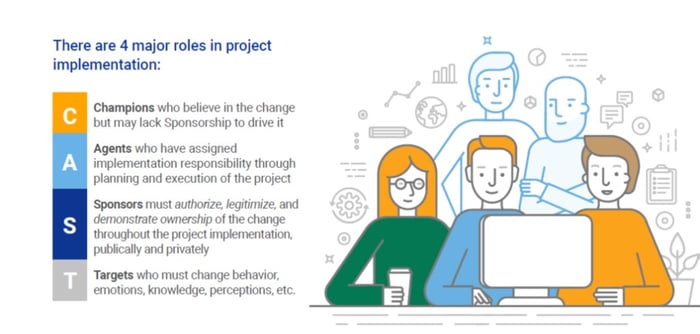Whether it is digital transformation, continuous improvement initiatives such as Lean Six Sigma, culture change or a shared services implementation, the success of any change project depends on the demonstrated Expressed,  Modeled and Reinforced commitment of all the managers and leaders who have direct reports that are impacted in some way by the change. This cascade of behavioral Sponsor commitment is the single most important factor in a fast and successful implementation.
Modeled and Reinforced commitment of all the managers and leaders who have direct reports that are impacted in some way by the change. This cascade of behavioral Sponsor commitment is the single most important factor in a fast and successful implementation.
But, all too often, Sponsors view their role simply as a figurehead or they think their role ends once the project is launched. What these leaders don’t realize is getting a project launched is the easy part! The truth of the matter is, Senior leaders must maintain laser focus on an implementation over the entire life cycle of a project.
Sponsorship Defined
In the AIM Change Management Methodology, there are 4 crucial implementation roles that create a CAST of Characters.
 Sponsors are defined as those who authorize, legitimize and/or demonstrate ownership for the change (Authorizing Sponsors) or reinforce the change at the local level (Reinforcing Sponsors).
Sponsors are defined as those who authorize, legitimize and/or demonstrate ownership for the change (Authorizing Sponsors) or reinforce the change at the local level (Reinforcing Sponsors).
Sponsorship, however, is not a voluntary position. A manager cannot choose whether to Sponsor a project. Leaders are automatically Sponsors if they have anyone reporting to them who will be impacted by the change. That’s the position part. But Sponsorship is both position and action!
Sponsorship is defined by 3 very specific behavioral actions that cannot be delegated to anyone else. Sponsors must:
- Express commitment to the change by what they say
- Model commitment to the new behaviors by what they do
- Reinforce the new behaviors by applying rewards and consequences within their chain of command
Equally important, there must be consistency between what the leader says, what the leader does and what the leader reinforces. This is the formula to build trust. Remember, trust and speed are functional; the higher the level of trust, the greater the speed of implementation.
Educating Your Sponsors
So, how do you ensure Sponsors are Expressing, Modeling and Reinforcing their commitment to a change throughout the life span of the initiative? The answer is relatively simple.
First, you must educate your Sponsors on their roles and responsibilities. Many Sponsors assume if they communicate a few times with the Targets, change management can be checked off the list of things to do. But as a Next Generation Change Agent, you know a Communication plan is not a substitute for an Implementation Plan.
Sponsors need to understand the importance of remaining active and visible while continuing to Express, Model and Reinforce their public and personal commitment to the change. In most cases, they are not being ineffective intentionally. They just, honestly, don’t know better.
Sponsor Contracting is Key
I spend a lot of time in the AIM Accreditation program, teaching the skill of Sponsor Contracting because in my experience, it’s the most important skill a Change Agent needs to have. I would even go as far as to say that all failed transformational change can be traced back to poor Sponsor contracting!
Sponsor contracting is the process in which Change Agents and Sponsors exchange their offers, wants and needs. The process is cyclical, iterative and must occur periodically so that Sponsors are constantly aware of what is expected of them during the entire life of the project--not just at launch.
Here are a few tips from the AIM Change Management Methodology on how to contract with your Sponsors:
- Be Specific: Throw away phrases like, “I need your support” because Sponsors will always say you have their support. If you leave the meeting with only their support, you’re not leaving with anything at all!
- Speak in Business Language: When you go to France, your best option is to speak French. When you go to Sponsorland you need to speak the language of Sponsors. The universal motivator for Sponsors is to get projects done fast, cheap and at a high quality. So, instead of talking in generic terms about change management, talk to your Sponsors in business terms and focus on results.
- Make Your Sponsor Look Good: Be sure when you ask for something from your Sponsor, you are protecting their time, money, energy and reputation. Make your Sponsor look great and you are far more likely to get what you are asking for.
The one single question every Sponsor has is, "Can I trust you?" It may take many forms, but it all leads back to trust! This trust is built when you do what you say you are going to do, and when you put Sponsors in a position for them to be and look successful. Change management is an exercise in power and politics. By building trust, through the use of Sponsor Contracting, you’ll be able to ensure your Sponsors remain active throughout the life span of your project.


